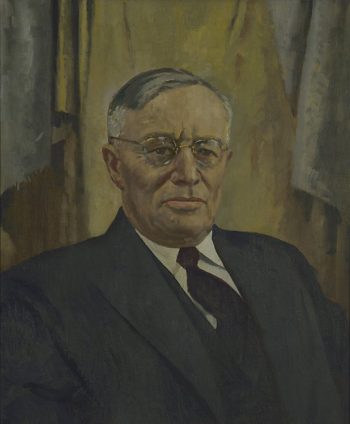The Hon. J.G. Gardiner
- Canadian Agricultural Hall of Fame
- Inductees
- The Hon. J.G. Gardiner

- Inducted: 1962
- Residing Province: Saskatchewan
- Gallery Location: 26
The Hon. J.G. Gardiner
- (1883
- -
- 1962)
A man who has been aptly described as a great Canadian, whose personal history exemplified the stamina required to make Canada great.
Rt. Hon. James G. Gardiner, B.A, LLD. held office continuously for 44 years, a record unequalled in Canadian political history. As Premier of Saskatchewan he did much to improve provincial highways and to extend rural electrification.
His greatest achievements were in the federal field where, as Minister of Agriculture for 22 years, he promoted and expanded PFRA, introduced the Prairie Farms Assistance Act, and granted aid toward the reclamation of low lying lands in the Maritimes.
He directed Canada’s agricultural production program throughout the Second World War, during which this country was a leading contributor to Britain’s food supplies; and guided the program of marketing Canada’s surplus products in the adjustment period, which followed the war.
Despite the many pressing problems associated with his official duties he always retained a keen interest in his farm at Lemberg, Saskatchewan, where a fine herd of Shorthorn cattle was maintained.
Un homme décrit avec justesse comme un grand Canadien, dont son histoire personnelle fait preuve de l’endurance nécessaire pour contribuer à l’excellence du Canada.
L’honorable James G. Gardiner, B.A, LLD. fût élu au pouvoir pendant 44 années, un record inégalé dans l’histoire politique canadienne. Comme Premier ministre de la Saskatchewan, il a fait beaucoup pour améliorer les grandes routes provinciales et pour étendre l’électrification rurale.
Ses plus grandes réalisations ont été en politique fédérale, où, en tant que ministre de l’Agriculture pendant 22 ans, il a promu et élargi l’Administration du rétablissement agricole des Prairies (PFRA), il a présenté la Loi sur l’assistance à l’agriculture des Prairies et a offert une aide financière pour l’endigage des basses-terres dans les Maritimes.
Il a dirigé le programme de production agricole du Canada tout au cours de la seconde Guerre mondiale, au cours de laquelle le Canada était un des principaux contributeurs aux approvisionnements alimentaires de la Grande-Bretagne. Il a aussi dirigé le programme de commercialisation des produits excédentaires du Canada dans la période d’ajustement qui a suivi la guerre.
Malgré les nombreux problèmes urgents liés à ses fonctions officielles, il a toujours conservé un vif intérêt dans sa ferme à Lemberg, en Saskatchewan, où on élevait un bon troupeau de bovins Shorthorn.
- Canadian Shorthorn Association


